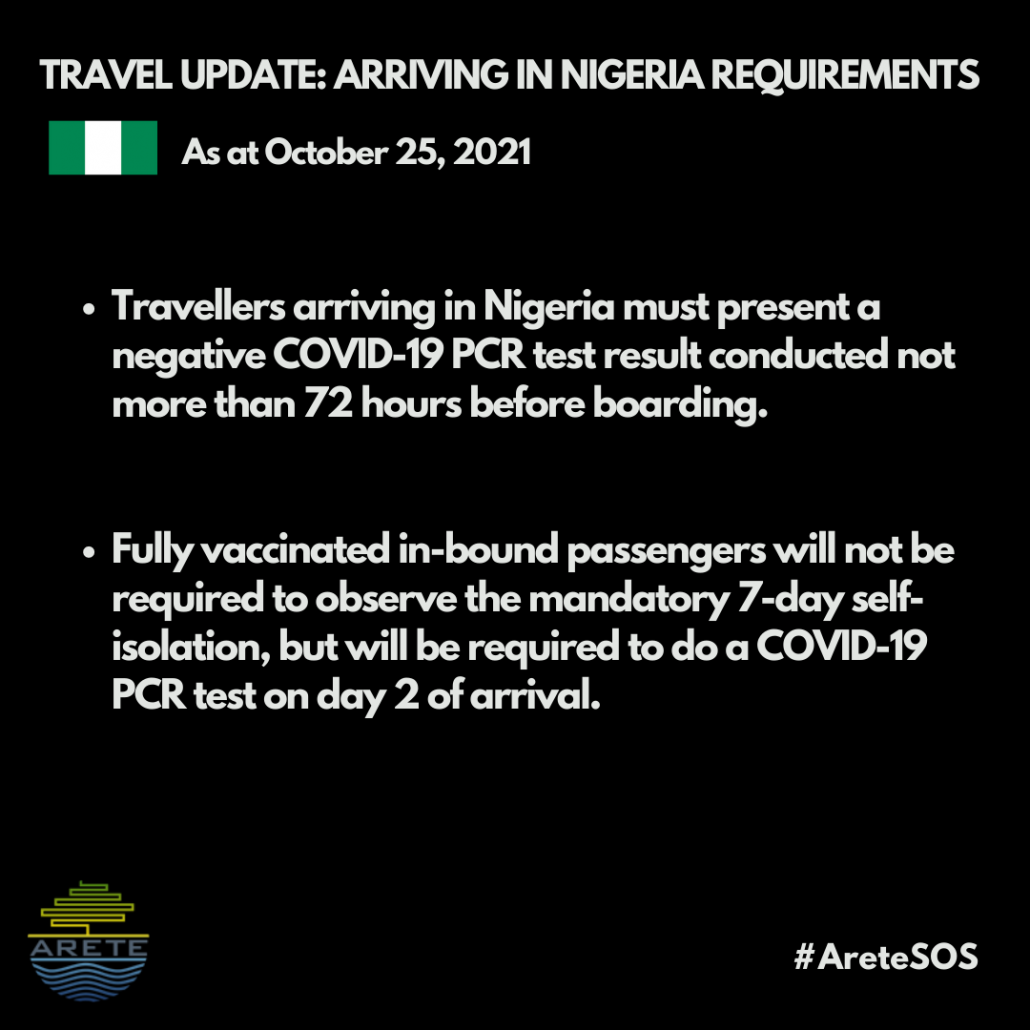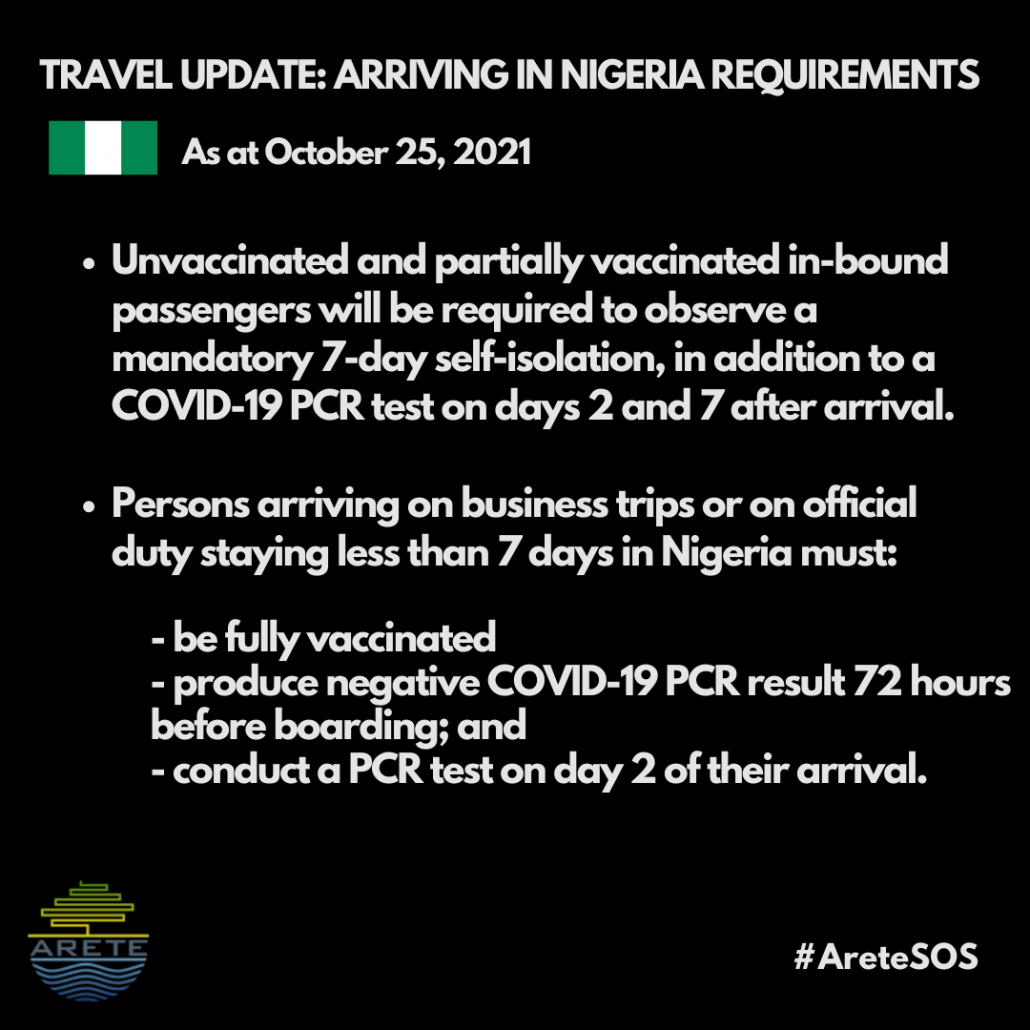Gulf of Guinea Maritime Insecurity: Are Local Waters Safer?
2021 has witnessed a reduction in the overall level of reported maritime criminality in Nigerian waters, but is this reported decline a reality or simply an illusion?
Arete examined this question in detail in our #AreteDeepDive piece on 28 October 2021, where we deconstructed the various trend indicators and their underlying factors as highlighted in the ICC IMB ‘Piracy and Armed Robbery Against Ships: Report for the period 01 Jan 2021 – 30 Jun 2021’ report. Click here to read it.
Our assessment and analysis showed that while there was indeed a reduction in reported piracy activity levels, the figures being quoted by various sources were possibly more a reflection of the systemic weakness in information gathering and ‘careful management’ of reporting of piracy and maritime crime by local agencies, as opposed to a genuine reduction in piracy activity levels (noting of course that a drop in incidents in Nigeria may also be due to a shift in the modus operandi of the pirate groups operating out of Nigeria, i.e. their now operating outside of Nigerian territorial waters and EEZ).
Since October’s analysis, we have witnessed several interesting developments in the overall security operating environment in the region, particularly in the Niger Delta. Key among these developments have been;
- Multiple attacks on and abductions of oil workers in the riverine environment in Bayelsa State;
- The action by the Danish frigate led to the deaths of four pirates, the wounding of a fifth, and arrest of others;
- Reports by the Nigerian Navy of widespread arrests of vessels carrying stolen crude oil;
- A report that Nigeria’s ports and anchorages have witnessed 27 attacks against vessels in the third quarter of 2021.
As is usual in the region, national and international media reported each of these developments according to their own interpretation and knowledge of the events and their significance, and the political or social leanings of the publication and individual journalists involved.
Given this, the aim of this latest analysis is to examine the events highlighted above and try to place them in the context of the overall pattern and evolution of security in Nigeria, its territorial waters, and beyond in the wider Gulf of Guinea.
Bayelsa and the Riverine / Onshore Context
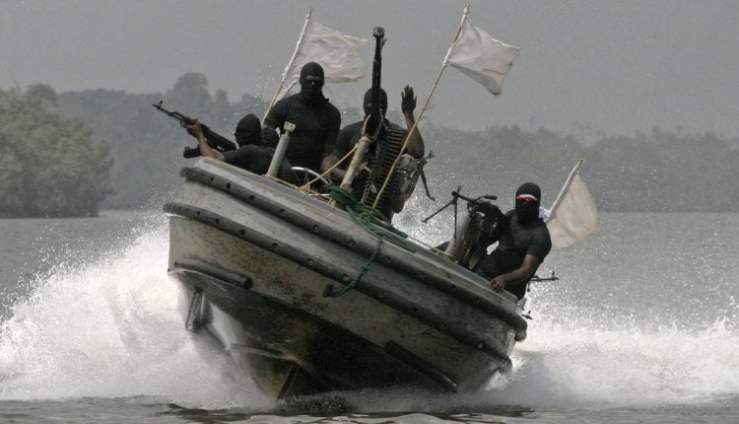
On 27 November 2021, criminals, labelled in the Nigerian media as “sea pirates”, attacked workers of the Nigerian Agip Oil Company (NAOC) at the Obama Manifold. It is claimed they killed seven workers and two members of the Nigerian Security and Civil Defence Corps (NSCDC).
The next day, they abducted four people working for NAOC in the Okoroma and Ogbokiri-Akassa communities in Bayelsa State, read it here. The attackers also reportedly shot dead two other workers as well as a member of the NSCDC. The boat driver, an indigene of Okoroma community, was reported missing after the incident while two other members of the NSCDC were declared missing but later found alive. It was also reported that gunmen abducted four people from the Imbikiri community in two separate attacks earlier in November.
While it has been suggested on local social media that these incidents might be evidence that pirates who traditionally operate offshore are now focusing their efforts in the riverine areas of Nigeria – implying that the threat offshore is now diminished – this assumption needs to be taken with a strong degree of caution.
Firstly, it is too simplistic and inaccurate to characterise that every group in the Niger Delta has the capability and intent to operate offshore. Indeed, the proliferation of small arms in the region means that armed criminal gangs are ubiquitous with many operating according to numerous, diverse ‘business’ models – including ones that only sees certain gangs operating in the riverine areas alone.
Many of these gangs that operate solely on the rivers and in the riverine communities have no need to operate offshore given the profits gleaned from conducting armed robbery against passenger boats, extorting protection money from communities, acting as protection teams for gangs stealing crude oil from pipelines (and escort the barges carrying stolen crude) etc.
In short not all gangs operating in or out of Nigeria are ‘sea pirates’ (as the media portray them) meaning the increased attacks in the riverine areas does not necessarily indicate that the gangs operating offshore have ‘gone away’ or changed their modus operandi at all.
Furthermore, and examining this incident against a historical context, it must also be noted that the area where these incidents took place is particularly active in terms of organised theft of crude oil and also that for one reason or another NAOC is targeted more than other operators in that part of the Niger Delta.
Indeed, and as reported by the local media, there may be other drivers that might have triggered the attacks, including dissatisfaction with contract delivery and payment of local youths working on NAOC security contracts. This is a credible assertion.
Historically, attacks on NAOC people and infrastructure in the region has frequently been attributed to issues with contract award, rollout or delivery. It is perhaps interesting that Total Exploration and Production Nigeria (TEPN), which also operates in the area, suffers far fewer attacks on people and assets. This would seem to support the hypothesis that NAOC’s problems are specific to that company rather than generic attacks on the industry as a whole.
Summarising all of the above it is assessed that the spike in activity in Bayelsa is very likely part of a cycle of activity that is linked to NAOC operations and is not a reflection of a change in the modus operandi of all pirate gangs that traditionally operate offshore.
International warship operations in the Gulf of Guinea
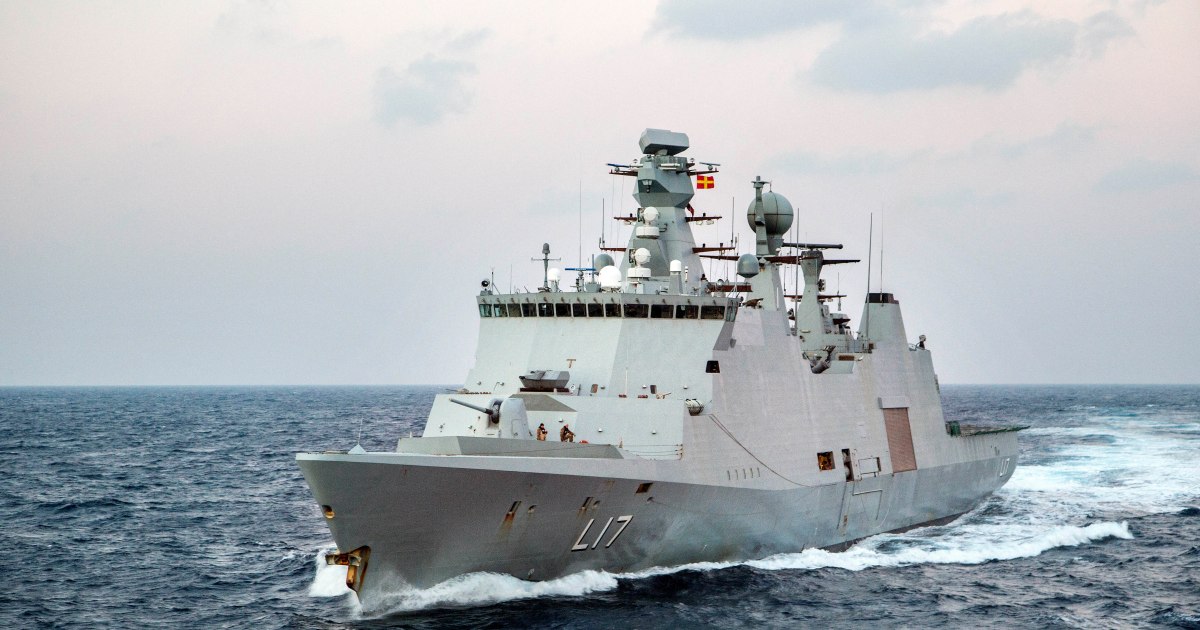
In a widely reported incident, on 24 November 2021, the Danish naval vessel HDMS Esbern Snare encountered a speedboat with a number of armed men on board. Read about the incident here. The skiff was also carrying equipment characteristic of piracy operations in open water. In the ensuing encounter, a warning shot was fired by the Danish crew, which was responded to by the pirates with a volley of shots from assault rifles. The warship crew opened fire, killing four pirates, and capturing four others – one of whom was seriously wounded. The injured man was treated on board the ship and all four detained on board. They are now facing a trial in Denmark. Read the fuller story by clicking here.
The incident sparked a significant debate about jurisdiction, sovereignty and rules of engagement. Amid the debate about the legality of the engagement, there arose several questions among social media commentators concerning the impact of the incident. Some of the key questions asked were:
- Would this act as a strong deterrent to Nigerian based pirate groups and force them to operate closer inshore (or even move their operations to the riverine areas as theorise above)?
- Will this incident drive pirate gangs to arm themselves more heavily and act more aggressively in the future?
- Will this encourage pirates to attack international warships in the hope they will survive and then face trial in the vessel’s home nation – with the hope of being allowed to remain in the country after sentencing?
Clearly, these questions remain unanswered at the present time, but they do raise significant concerns for the shipping industry. Indeed, it is guaranteed that pirate gangs operating in the region will be carefully assessing what the presence of foreign warships in the region now means for their operations and criminal business models. Whilst the presence of international warships may deter some individuals, it is highly unlikely that well-organised pirate groups will cease operating.
One key point of this incident is the fact that the Danish vessel was responding to an intelligence report relating to an elevated threat of piracy in a specific area. The value of good intelligence is heavily underlined by this, and it is likely that the Nigerian Navy and NIMASA are now considering how their own intelligence capability measures up to that which drove this event (noting the country has invested heavily in the Deep Blue Project, which ironically is designed to undertake the kind of interdiction operations the Danish vessel was undertaking).
Another key point is this incident occurred despite a series of Nigerian Navy exercises that culminated in the 04 November Exercise Grand African NEMO 2021, which saw participation of 13 naval vessels as well as elements of four foreign navies. Read about the exercise by clicking here.
What is clear is that the Gulf of Guinea’s strategic significance to a number of states beyond Africa is increasing, and with as many as six foreign naval vessels operating in the region currently, the Nigerian based pirates appear to now be facing a significantly elevated threat to their own operations. What is yet unknown is whether the Danish incident will affect foreign navies appetites to undertake operations in the Gulf of Guinea moving forwards.
Illegal Bunkering and the Export of Stolen Crude Oil
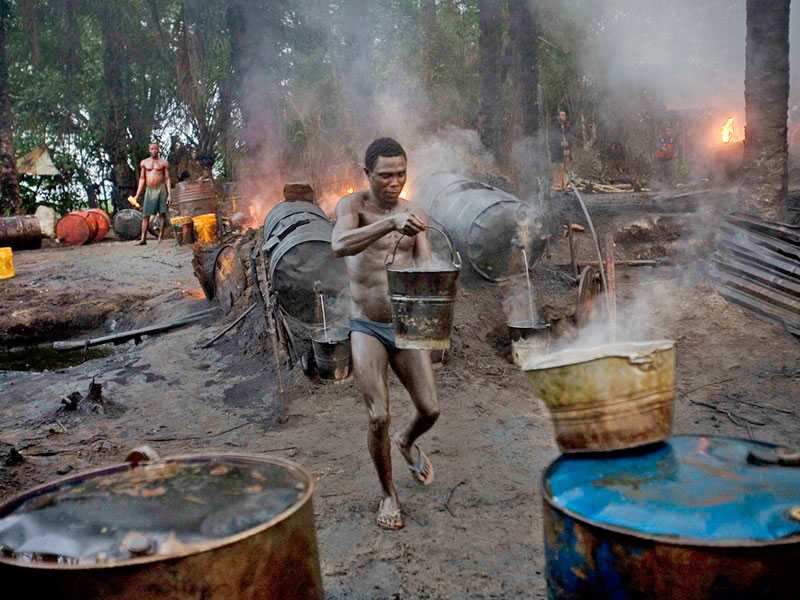
On 07 December, media reported that the Nigerian Navy had intercepted four wooden boats laden with 16 thousand litres of illegally refined diesel, click here to read the story. This is just the latest report highlighting an enduring aspect of the kaleidoscope of criminality that endures throughout the Niger Delta region. Earlier in the year, other reports reflect the scale and scope of the illegal refining as well as the industrial levels of theft from Nigeria’s pipeline networks in the region. Arrests and seizures were made in Rivers State in September, read about some of them by clicking here. and in May 2021 the Nigerian Navy said it had intercepted about 128,612 barrels of crude oil valued at about N2,598,219,624 (approximately USD $6.24 million at today’s exchange rate) and 15,317,150 litres of AGO valued at over N3 Million (USD $7,200) between January and May.
This level of criminality is sustained by poverty and weak security along the region’s pipelines and rivers. The arrests and seizures represent a very small percentage of the overall levels of theft from the pipeline networks and well-heads in the region, but it goes some way to illustrate the diversity of security challenges and the degree of overstretch faced by the country’s security forces including the Nigerian Navy.
What is also clear is interdicting this type of criminality impinges heavily on the Nigerian Navy’s ability to secure the country’s riverine and maritime environment as scarce resources and over-tasked assets are stretched. The knock-on from this is the creation of greater operating space and freedom to operate for the piracy gangs that remain operating offshore.
The above being said the Nigerian Navy response to this persistent criminality is becoming more robust and proactive. On 12 December 2021, the Navy reported that it had deployed 10 warships, two helicopters, and elements of the Nigerian Special Boat Service and other military units in an exercise in the Onne area of the Bonny River.
This deployment, like that of Grand African Nemo 2021 last month, is focused on the riverine and inshore environment. The Navy statement revealed that exercise participants will conduct anti-piracy operations, protection of offshore oil and gas facilities, fleet manoeuvres and communication and gunnery as well as Maritime Interdiction Operations, including, vessel board search and seizure, opposed boarding, search and rescue and operations to curtail the activities of pirates/sea robbers, oil thieves, pipeline vandals and illegal bunkerers. This ambitious program includes tactics and techniques that have recently been practiced alongside Royal Marines from the British Royal Navy’s HMS Trent, a Batch 2 River-class offshore patrol vessel, read about it by clicking here.
Persistent Crime in Nigeria’s Ports and Anchorages
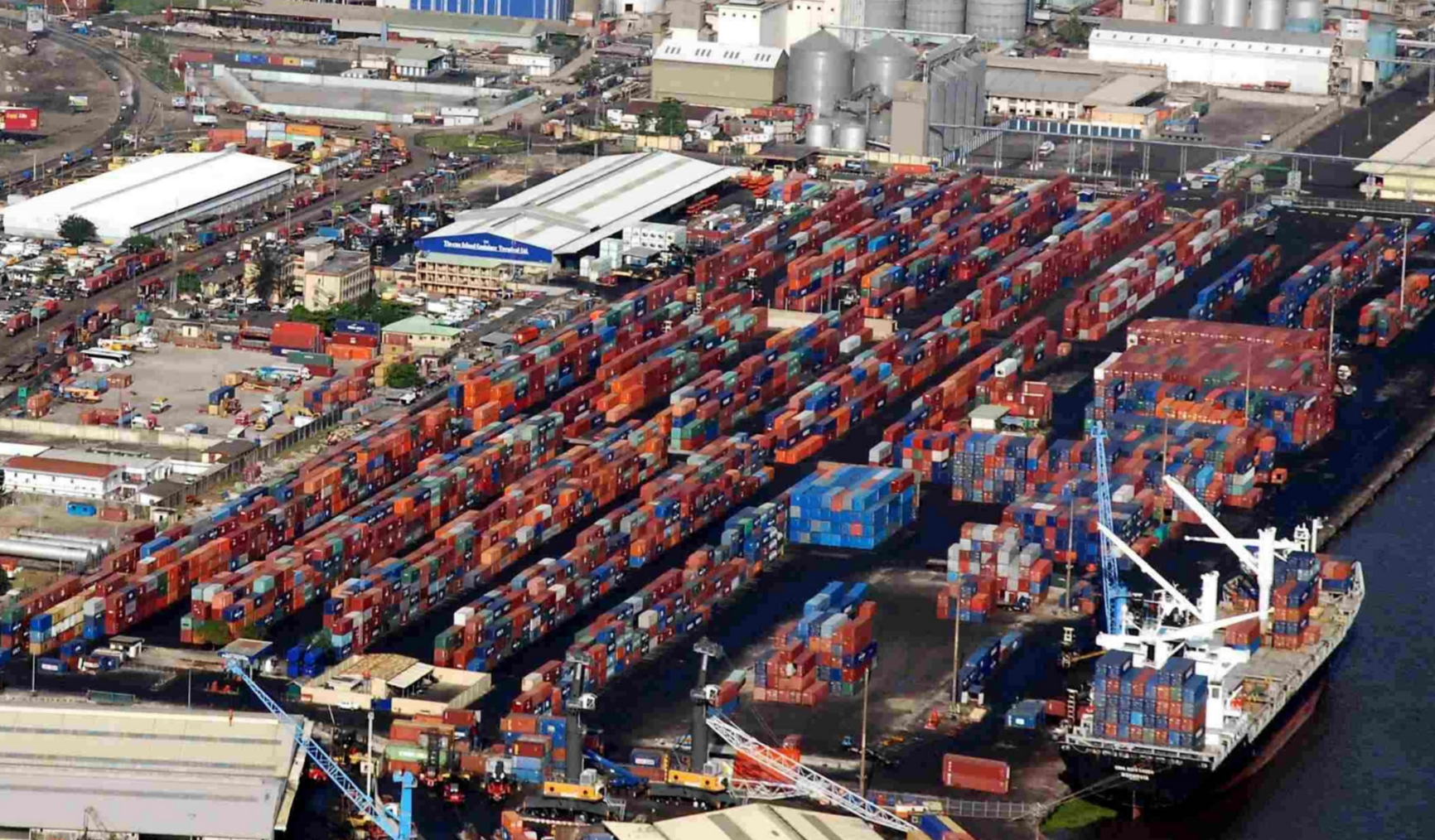
On 08 December 2021, NIMASA revealed that there had been a total of 27 security incidents involving ships in various ports and anchorages in the country during the third quarter of the year. This is an interesting revelation as the vast majority of these incidents had previously gone unreported. Whilst no details of the nature of the incidents was given, they are likely to include illegal boardings and theft. Such attacks represent lucrative chances for opportunistic thieves who live and work in and around the ports and anchorages. They are relatively low risk enterprises as most historical data shows the perpetrators escaping and remaining at large after the events. Very few crews will tackle boarders directly due to the safety concerns for themselves. This leaves the thieves free to escape when detected. Whilst they do contribute to the overall levels of risk facing seafarers and shipping companies, these attacks are separate and distinct from the sea piracy that occurs on open waters in both the nature of the crime and the perpetrators involved. However, some analysts include them in piracy statistics, which can be misleading.
Whilst the human impact of such incidents is low, the financial impact on the shipping companies is potentially significant. Any vessel that is declared a scene of crime will incur additional costs if forced to remain in the port where the incident occurred. The impact on insurance premiums, and other costs (replacement of equipment and stores etc), is cumulative though and the overall levels of criminality drive up insurance premiums – but only if the incidents are reported or a claim made. It is likely that, for these reasons, many incidents remain unreported, and the true rate of crime in ports and anchorages is much higher than that reported by NIMASA.
Further Incidents Deep Offshore
On 13 December, it was reported that at 14:27 hrs UTC a Liberian flagged container vessel was attacked and boarded by armed men in a position approximately 48 nautical miles southwest of Luba on Boko Island, Equatorial Guinea, and due south of Opobo in Rivers State. Read the news report by clicking here.
The vessel managed to send a mayday message and a helicopter responded from the Danish warship HMDS Esbern Snare, which was in the area. On arriving at the vessel under attack, the helicopter crew observed a speedboat alongside the vessel with both pirates and abducted crewmembers on board. After throwing unidentified objects into the water, the speedboat departed to the north with the helicopter shadowing from a safe distance until it returned to the warship.
As soon as the pirates had departed, the warship received a message that a crew member had been injured during the attack on the merchant vessel. Images seen by Arete analysts confirm other reports that the attack was very violent with the injured crewman receiving gunshot wounds to his lower leg. He was evacuated to the Danish warship where he received medical treatment. The warship remained on station and assisted in a search for two missing crew members.
Elsewhere in the region, in the early hours of 13 December, two vessels reported being approached by a small boat with armed men on board while they lay at anchor in the Owendo Anchorage in Gabon.
In the first incident, 5 men armed with assault rifles boarded a cargo vessel. The crew took refuge in the citadel. Nothing was reported stolen.
In the second incident, 12 armed men were seen on board a boat, which approached to within 15 metres of the unnamed tanker before being deterred by an alert crew shining lights on the boat.
These three incidents, when taken together, underline the fact that the pirate gangs have not retired, adopted a new modus operandi or shifted their operating footprint. The threat remains extant throughout the Gulf of Guinea and all shipping companies should continue to operate accordingly.
Summary
The maritime and riverine environments in Nigeria remain high-risk operating environments for shipping companies, seafarers, oil company employees, and local commercial boat operators and their customers.
Indeed, this analysis shows the multi-faceted nature of the environment with its different layers of actors and diverse forms of criminality. What is clear is the pirate gangs have not gone away despite the IMB reporting a decrease in the number of reported incidents.
It is also evident the ‘sea pirates’ remain focussed on deep water interdiction and undertaking hijack operations with the primary intent of kidnapping crew and thus remain a potent threat to all mariners in the region.
Finally, the oversimplification of the threat picture by the media more often hinders, not helps, shipping operator’s decision making and thus, as always, we advise key stakeholders to seek the advice and assistance of professional risk management experts such as Arete to help keep vessels and crew safe while operating in the Gulf of Guinea, particularly in Nigeria.
Pirates kidnap NSCDC personnel, 4 oil workers in Nigeria
According to news reports by various sources including Nigeria’s Vanguard newspaper, suspected pirates have abducted an operative of the Nigeria Security and Civil Defense Corps (NSCDC) and four contract staff working at the Conoil field in Koluama 1 in Bayelsa. A Spokesman of the NSCDC in Bayelsa, Solomon Ogbere, confirmed the development, saying:
“I can confirm that we are in receipt of the report of kidnap. One of our officers and four civilians were kidnapped while heading to their location where they protect Conoil facilities. They were all in mufti while returning to their base when they were attacked. Investigation is ongoing to track down the culprits.” Read the full report by clicking here.
Of additional note on October 20, 2021, the Bayelsa state government was forced to impose a curfew and ban the use of speed boats with 200 Horse Power Engines on all waterways in the state as a response to increasing pirate attacks.
With these latest incidents in mind, alongside the recently reported killing of four pirates by a Danish frigate (read that news update by clicking here), what does this mean for maritime security in the Gulf of Guinea? Our next #AreteDeepDive analyses these developments and examines the ‘so what’ for shipping operators in the region.
Follow us on social media (@areteafrica on Instagram and Arete Africa on Facebook and LinkedIn) to get an update once it is published.
Omicron variant: Latest Nigerian Travel Updates
The recent emergence of the Omicron variant has led to rapid changes in international travel restrictions. Nigeria and other African countries have been affected by these restrictions and have also created new entry requirements themselves. As of the 6th of December, 2021, these were the latest updates:
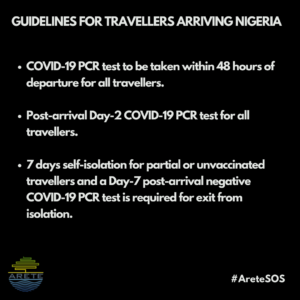
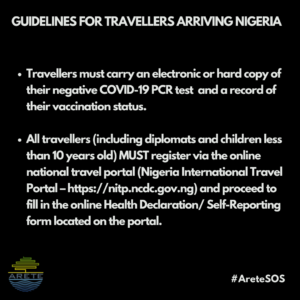
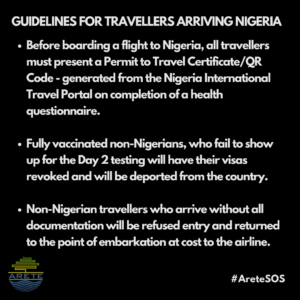
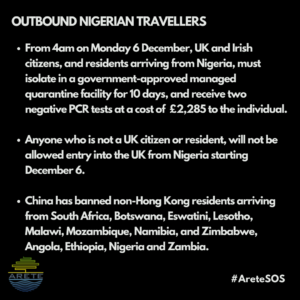
Arete will continue to closely monitor the situation and provide updates. Where you require travel management services, send us an email at info@arete-group.com or click here to contact us.
NIMASA Determined to Remove War Risk Insurance Surcharge
On 15 November, Mr. Ubong Essien, Special Assistant on Communication and Strategy to the Director-General of NIMASA, disclosed that NIMASA remains committed to achieving the lifting of the War Risk Insurance (WRI) Additional Premium, often referred to as a ‘surcharge’, imposed on international shipping operating in part of the Gulf of Guinea by the Joint War Risk Committee. (JWRC)
In September 2021, Arete reported the same ambition still being held by the Director-General of NIMASA, Dr. Bashir Jamoh, despite a rebuff by the JWRC following a previous lobbying attempt by NIMASA in June. The position of NIMASA is premised on the apparent reduction in piracy and other acts of maritime criminality in Nigerian and littoral waters of other Gulf of Guinea states.
While the piracy figures in the region have indeed fallen in 2021 compared to previous years, there are many variables and numerous underlying factors that may explain the drop in the number of reported piracy incidents other than an increase in regional maritime security. Arete published its own analysis of these factors, including a review of the current rate and intensity of maritime criminality in the region, in October 2021, you can read it here.
The key issue behind the drive to remove the surcharge is the economic impact on Nigeria’s macro-economic situation, as shipping operators seek other options other than to use/enter Nigeria’s congested ports. Additionally, the inflationary pressure felt in the domestic markets as suppliers pass on the additional costs of shipping goods into the country is significant.
The rapid response by the JWRC to Nigeria’s previous lobbying in June 2021 reflects the conservative position of the Committee. The JWRC is a grouping of underwriting representatives from the Lloyds Market and other insurance underwriters’ associations. The body meets quarterly to represent the interests of marine hull insurance business and identifies so-called ‘Hull War, Piracy, Terrorism and Related Perils Listed Areas’. Listed Areas are defined as those areas where risks are elevated to the point where additional insurance cover is required to protect shippers against those risks.
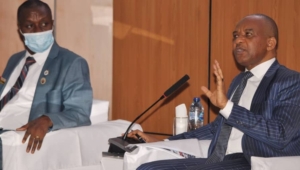
The Committee sets the Listed Areas purely for business reasons and does not have any political or security function. This is an important point as it means the Committee’s decisions are purely pragmatic and driven by metrics. What that means for Nigeria is that although the country has invested heavily in securing its territorial waters, the strong evidence that acts of piracy outside those waters, in the EEZ and beyond, are still being carried out by Nigerian organised crime groups (OCGs) generates a view that there remains a latent risk inside Nigerian waters. Furthermore, the listed area encompasses the territorial waters and EEZs of other littoral states in the region. It is unlikely that the JWRC will lift the Listed Area status for Nigerian waters when Nigerian gangs continue to prey on shipping in neighbouring states’ waters.
Arete sources reported that in the last two weeks the Nigerian Senate approved the borrowing of a further $16 billion by the Federal Government, $1 billion of which will go into defence and security budgets. It is hoped that some of this will trickle down to projects and procurement programs aimed at defeating maritime criminality in the region. However, the extensive, diverse, and relentless instability onshore is possibly of greater priority – or certainly of a higher profile at the moment.
While it is evident that the Nigerian Government has serious intentions of dealing with the threats in the Gulf of Guinea, there remains much work to be done onshore to defeat the fundamental drivers of the criminality that pervades the region’s waters. Meanwhile, the JWRC will seek evidence that the apparent reduction in maritime crime is genuine and sustainable before any real prospect of lifting the Listed Area status of the Gulf of Guinea is likely. For now, Dr. Bashir Jamoh’s ambitions will likely remain just that, with little prospect of any substantial change.
However, there is a possibility that a political initiative might move the problem forward. In 2010, a new form of maritime crime emerged. Several cartels operating out of Nigeria began extended hijackings of oil products tankers and chemical tankers for the purpose of extended cargo theft in ship-to-ship transfers. The stolen cargo was being sold into storage tank farms in Nigeria and elsewhere in Africa. This very lucrative criminal enterprise continued until early 2014 when the US government revealed to the Nigerian Government that it had detailed and accurate intelligence on the identities of the criminals behind the trend. It was suggested in media reporting at the time that the list of names included people close to the government. The practice of hijacking tankers and stealing of cargoes ended almost overnight.
Perhaps if the economic cost to the country caused by piracy in the region is deemed to be sufficiently damaging, the Federal Government might exert the same pressure that shut down the cargo theft cartels. This would be a game-changing step forward for Mr. Jamoh and Nigeria.
Danish frigate kills four pirates in Gulf of Guinea
The Danish Navy has released a statement that the Frigate Esbern Snare currently operating in the Gulf of Guinea, was able to respond to reports issued of an increased threat of piracy in the South of Nigeria. The Naval Frigate deployed the Seahawk helicopter to carry out advance observations.
#AreteUpdates: Piracy in the Gulf of Guinea
At 0100hrs yesterday (11th November) a vessel was boarded south of Brass, with 5 crew reported kidnapped. As yet the vessel name is unconfirmed and details of the attack remain unknown. This is the latest incident to have been confirmed in the Gulf of Guinea noting that since the issuance of the IMB report (end of Q3, Sept 2021) there have been an additional 5 reported piracy incidents that have taken place, including the MSC Lucia which was boarded and where the crew was then rescued/assisted by a Russian Navy vessel which was conducting patrols in the area. You can read about that incident here. On the same day, a second container ship was also believed to have been boarded with unconfirmed reports of the potential kidnapping of 3 crew, along with another incident in Conakry where armed pirates boarded an anchored vessel and stole laptops and computers.
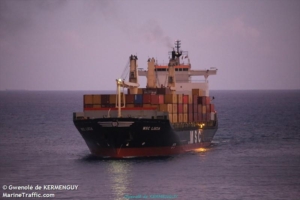
At the beginning of November, a passenger boat was attacked in Bayelsa State; the attackers opened fire forcing the vessel to stop, then boarded and stole passenger’s belongings (read here). This appears to show the increase in attacks that we would usually expect to see in the last quarter of the year, although potentially this has been somewhat delayed this year compared to previous years.
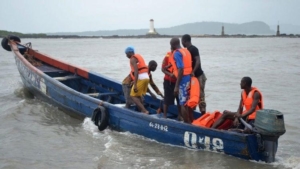
The IMB report raises some interesting points and the huge coverage in local and international media of the efforts being undertaken by both Governments/military in the region as well as international assistance may well be acting as a deterrent for some attackers. However, we must view these in the context that this report only accounts for incidents reported to IMB. In Q3, they show only 5 incidents reported; whereas our intelligence at Arete shows 11 in the same period.
Taking the 11 reports we have witnessed for Q3, 9 were successful (robbery, boarding, attempted boarding) – an 82% success rate.
Reported/non-reported incidents aside, what is very clear is that whilst reported incidents may be down, the level of violence has not reduced in the Gulf of Guinea, with the region accounting for the 2 vessels fired upon and the hijacking and all 51 crew kidnapped globally in the period. These statistics/incidents are what owners, charterers, etc should be most aware of as these are what impact voyages and, more importantly crews.
Contact us at info@arete-group.com to discuss the services we offer to mitigate these risks.
Nigeria Shuts Down DPR
Following the passing into law of the Petroleum Industry Act (PIA), which was signed into law by President Buhari on 16 August 2021, the Department for Petroleum Resources (DPR) will now be replaced by a new agency. Together with the Petroleum Products Pricing Regulatory Agency (PPPRA), and the Petroleum Equalisation Fund (PEF), the DPR has been scrapped to be replaced by the Nigerian Midstream and Downstream Petroleum Regulatory Authority (NPRA), and the Nigerian Upstream Regulatory Commission (NURC).
These fundamental changes to the regulatory structures that govern the Nigerian oil sector are of specific interest to oil and gas operators, service companies, and security providers that provide services to those companies. In the security sector, service providers also require permits from the DPR to deliver services. These permits are a legal requirement to operate legitimately and without them, they cannot legally support oil and gas sector clients.
There has been some speculation as to what will happen to these permits when the DPR ceases to function and how oil and gas providers will continue to operate during and after the transition. Received wisdom from within the DPR indicates that existing permits will remain valid until their projected expiry date. At that point, they will be replaced with new permits issued by the successor organisation.
The process for this will remain an online application and submission of supporting documentation. Fees will also be paid online. If this transition goes according to plan, there should be no interruption to service delivery by security providers. Arete will continue to monitor the situation closely and keep all our clients informed of any changes in the projected transition.
You can read more about the closure here.
Piracy Drop reports from Gulf of Guinea – Is this Progress?
There is a general acceptance among maritime security analysts that the Gulf of Guinea has witnessed a reduction in piracy and maritime crime in 2021 as compared with previous years.
The International Chamber of Commerce’s International Maritime Bureau (IMB) reported that in the month of June 2021 just four incidents of successful or attempted attacks on vessels were reported. This compares very starkly with the same month in the previous four years which saw 13 incidents in 2017 and 31, 21 and 14 incidents in 2018-2020 respectively.1
The Maritime Domain Awareness for Trade: Gulf of Guinea (MDAT) biannual report for the first half of 2021 listed a total of 38 incidents in the region. This compares favourably with the total of 68 reported for the equivalent period in 2020.
Despite this apparent fall in the number of incidents, the Gulf of Guinea is still the most active hotspot in the world for maritime kidnapping and hijacking. Data held by Arete analysts indicates that in 2020, more than 150 mariners were abducted in the region, 99 of which were abducted in the waters of countries other than Nigeria. Thus far, in 2021, the same data shows that 56 mariners have been abducted from vessels outside Nigerian waters and 13 taken from passenger boats on the Bonny River. This apparent elimination of maritime kidnapping from Nigeria’s coastal waters is a very positive development, However, the long-range attacks continue to persist.
The key question is whether this is an anomaly or a reflection of a significant change in the threat levels in the region. If we look just at open-source statistics, there does appear to be a significant reduction in the levels of activity. But is that the whole picture?
IMB Statistics show a total of 22 incidents reported in 2021 in Nigerian waters. Data gathered by Arete analysts for Nigerian waters show a total of 7 (7) in January, 5 (6) in February, 4 (7) in March, 1 (2) in April, 1 (3) in May, 1 (2) in June, 1 (2) in July, 1 (1) in August and 2 (0) in September. Note: the number in brackets shows the number of incidents recorded by Arete in the region outside Nigerian territorial waters and Economic Exclusion Zone.
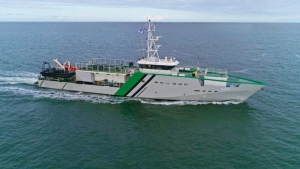
This very quick comparison of statistics reveals a fundamental problem in the reporting of security incidents – that of definitions and categorisation. The United Nations Office on Drugs and Crime (UNODC) records incidents using a methodology very similar to that used by Arete 2 and includes riverine activity on navigable inland waterways as well as distinguishing between coastal waters and deep offshore activity.
In contrast the IMB only records incidents against ships that are internationally registered and therefore almost all the riverine activity and much of the activity in territorial waters continues to go unrecorded. This is an important consideration, as many groups that use riverine crime to build up their funds and to obtain additional boats and engines then progress to attacks on commercial vessels in coastal waters. Thus, the overall picture serves to generate sometimes valuable warning and indication of an emerging capability for a group that will then expand its operations to impact on commercial shipping. Additionally, a lot of activity against commercial fishing vessels occurs inside the 12-mile limit and many of these incidents are unreported as the vessels are only locally registered.
While these different methodologies and reporting criteria serve their own purpose in that they support the information requirements of the bodies compiling the data, the resultant understanding of the threat can sometimes vary quite significantly. Whilst this might lead to varying perceptions concerning the rate of criminal activity, there is a consensus among analysts that the overall levels of reported activity have fallen quite significantly in 2021. So why is this?
Causes
Under-reporting of activity is complex. It can be driven by variables in reporting criteria from one organisation to another. However, and of greater significance, it can also reflect systemic weaknesses in the platforms and communications channels used to report activity. Furthermore, there are commercial and sometimes political factors that also result in under-reporting of incidents.
Commercial shipping is vulnerable to heavy costs if a vessel is delayed in a port. Thus, many incidents are reported to a vessel’s Company Security Officer but not to a local port authority. The concern is that a vessel could be delayed for considerable periods if it is declared a scene of crime by a littoral state’s law enforcement bodies. Furthermore, a vessel’s history and projected routes will be factored in to setting insurance premiums. Even crewing costs might be affected if a vessel has an established history of incidents.
It is sometimes speculated that littoral states manage the threat picture very carefully to manage costs of shipping goods through busy ports. There is currently great concern among politicians and maritime bodies in Nigeria that the continuing application of War Zone surcharges against commercial shipping insurance disadvantages their maritime trade and impacts on the onshore economy as costs are passed on to customers.
The above factors can generate a picture that falls short of the reality and security analysts have for several years believed that the actual rate of incidents involving shipping is significantly greater than that reported in open sources.
The UNODC raises the question of whether there has been a reduction in the levels of support offered to the pirate and criminal gangs among their host riverine communities in the Niger Delta. This is an interesting consideration as all piracy emanates from onshore communities. The UNODC report points out that the riverine armed robbery gangs have a different relationship with host communities, compared to a gang operating deep offshore. The latter will often disburse some of their profits among sections of the community, thus buying favour, whereas a riverine armed robbery gang will often have a heavy negative impact on its host or neighbouring communities.
This is reflected in Rivers State where, in July 2021, after a hiatus of 7 months, we witnessed the return of armed attacks against passenger boats on the Bonny River. The impact on travellers using the waterways is heavy, with deaths, abduction and financial loss being the normal consequences of such attacks.
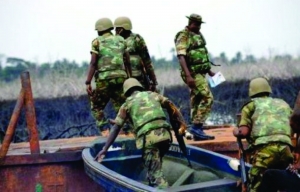
We have also seen an evolution in the capability and behaviour of the more organised criminal gangs. The UNODC report speculates that between four and six organised crime groups (OCGs) now operate deep offshore, conducting most of their attacks outside the Nigeria EEZ in the waters of neighbouring countries, or international waters. This reflects the acquisition of vessels that are now used as motherships, which reflects the vastly increased levels of investment into the equipment and vessels required by the gangs to operate at such distances.
The implication is that the gangs now have serious backers with deep pockets. It is likely that these funds originate in the huge amounts of money disbursed by the Federal Government of Nigeria as part of its Niger Delta Amnesty program as well as the multi-million-dollar contracts awarded to companies owned by former Niger Delta militants.
The increased operating range of these groups, as well as the higher capacity to take and detain abducted mariners on mother ships, means the gangs have also evolved their modus operandi but also their expected revenue streams. Thus, ransom rates for mariners kidnapped deep offshore have been inflated and now far outstrip the ransom rates for riverine passengers and mariners abducted in inshore waters.
We have witnessed a significant change in the operating range of Nigeria based pirate groups in the last two years. They now readily operate around 200NM from nearest landfall. These groups have much greater endurance and can remain at sea for weeks rather than hours or days. They have also, as described above, acquired the capacity to hold greater numbers of abducted mariners, which means the same group might now be responsible for multiple attacks within a single operation. These groups will attack opportunistically when in transit between their long-range operating area and their home bases in Nigeria. However, this increase in range sometimes leads to a misperception that the threat is somehow decoupled from the overall threat in Nigerian Waters whereas in reality, it is a significant increase in the severity of the threat.
The capacity and confidence to hold larger numbers of captives at sea for prolonged periods has generated a kidnapping trend which contradicts the overall incident trend numbers. The number of mariners abducted in the region has steadily increased, with data from the MDAT showing the total number of abductees increasing from 37 in 2015 through 54 (2016), 60 (2017), 99(2018), 146 (2019), and 142 (2020).
This contrast with the falling overall number of incidents indicates a shift in targeting and the ‘business model’ adopted by the pirates. Clearly, their aim now is to acquire funds through fewer operations that have a higher capacity to generate revenues – more abductees per incident.
Ransom values have also increased substantially when associated with the long-range pirate groups, with ransom payment more than 10 times the 2008 value according to data provided by UNODC. A further indication of the increasing sophistication of the kidnapping industry is evidenced by a single reported case of a ransom demand being made using Bitcoin as the payment currency.
This use of mother ships allows the gangs to reduce their time at sea and allows them to operate in areas where the indigenous navies have lower capabilities than those of the Nigerian Navy, both of which reduce their exposure. This operating profile also allows them to operate a more advantageous economy of scale than previously. The overall effect is to make their ‘businesses’ leaner and more profitable.
If we separate the activities of these deep-water groups and focus on inshore piracy and armed robbery, we see a slightly different picture. While the deep offshore threat is expanding, that of the inshore gangs seems to be contracting. Setting aside the problem of under-reporting, there does seem to have been a reduction in activity levels. We have seen almost no reports of boardings in the Lagos anchorage and few reports of similar activity in the ports of Lagos or Onne. Furthermore, there is a significant reduction in reported attacks on coastal shipping and riverine commerce. So, what has changed?
The Nigerian Government and Nigerian Navy have attributed this significant change to the program of equipment procurement for the Navy and the launch of the Deep Blue project, which is claimed to have the capability to monitor coastal activity along the entire seaboard of the country.
The commissioning of the Deep Blue system may well have had an effect on the maritime dynamic in Nigeria’s coastal waters, particularly the integrated surveillance and response capability that has the potential to change the operating environment for both commercial shipping and maritime criminals.

It is still probably too early to say conclusively whether its launch has achieved the aim and it might be that the reduction in coastal activity levels is entirely coincidental and driven by other factors. We have yet to see the system’s full capability demonstrated in a coordinated interdiction of a criminal group, but we cannot rule out the possibility that its mere existence has served to deter criminals from going to sea.
In time, as the various maritime bodies in Nigeria learn how to operate the system to its optimum capacity, we might see the coastal waters actively patrolled and aggressive, intelligence-led interdiction of maritime criminals at sea. The system will only come into its own however if it is fully integrated with other capabilities – onshore intelligence gathering and security forces operations to disrupt or detain criminal gangs. To achieve this, the Nigerian authorities will need to overcome inter-agency rivalries and generate truly integrated operations based on intelligence fusion centres and agile decision-making structures that can deploy the right response, to the right place, in the right timeframe.
One other factor that has possibly impacted on the overall security of the region is the ever-increasing international interest in the region. 2021 has seen the deployment of several foreign naval assets to the region, including warships from Italy, France, the USA, and most recently from the UK. HMS Trent recently arrived in Lagos with a team of Royal Marines on board (see our previous article here). The latter specialise in cross-decking, boarding, and interdiction operations. It is intended that they will conduct several training exercises with indigenous navies during their five-country, three-month deployment. This reflects the UK government’s acknowledgment of the region as a strategically vital region for commerce. Japan has also pledged to invest $260,000 in training and other programs to support efforts to combat piracy in the region.
Regional cooperation and information sharing among indigenous navies is evolving – but very slowly. Numerous summits have been held over the last decade, and they invariably conclude with ambitious statements about international cooperation. Unfortunately, as genuine as these ambitions are, they are rarely enabled; protectionism and vested interests undermine the results. However, there is an incremental improvement in the amount and effectiveness of international cooperation. This is driven by economic reality and, over time, will generate greater effectiveness in cross-boundary/border operations.
Other factors should also not be ignored, and these include the links between criminality and the electoral cycle in Nigeria. Historically, as an election approaches, acquisitive criminal activity increases. This is true of the maritime domain as well as onshore, with historical links between spikes in inshore criminal activity and the generation of electoral funds for some campaigners in the coastal states of the country. Currently, Nigeria sits in mid-term, which has generally seen a lowering of maritime criminal activity. However, as the next election approaches, we should expect to see an increase in robbery, hijacking and kidnapping in Nigeria’s waters.
Additionally, we have recently seen greater efforts by the courts of Ghana and Nigeria to pass down meaningful sentences to criminals convicted of acts of piracy and maritime armed robbery (see our piece on a recent Togolese court ruling here). Whilst it is normally the low-ranking ‘foot soldiers’ who are captured and tried, the imposition of long jail terms on those convicted might serve to loosen tongues and reveal the sponsors and patrons behind the pirate gangs. In the short term, this could weaken the resolve of the low-ranking actors and serve as a warning to the men in the background. In the long term, this could result in the exposure of a senior sponsor behind one of the gangs – although any resultant prosecution would require considerable political will if the prosecution is to be successful.
While there does appear to be a reduction in piracy according to open-source data, anecdotal information suggests that significant numbers of incidents are not reported. It is not possible to say whether this reporting gap is contrived or simply attributable to systemic challenges. It is also hard to say whether the under-reporting has escalated, although the percentage of successful attacks within those reported has increased, which would indicate again that more are not being reported. What can be determined is that the threat to mariners in the region remains severe, with the risk of kidnapping being higher in Gulf of Guinea waters than anywhere else in the world. Additionally, the region hosted all of the world’s hijackings in 2020-21.
Finally, as we approach the end of the year, we should expect to see the annual trend of a spike in maritime criminal activity in the run-in to Christmas and other end-of-year festivities. The next few weeks will be informative insofar as if the downward trend is maintained then we might need to consider the possibility that a fundamental shift has occurred. However, if we see a spike in activity, it might suggest that the reduction in activity rates this year might be anomalous or just a temporary lull.
Therefore, Arete recommends that commercial shipping organisations maintain their existing states of preparedness and countermeasures. Ship Security Officers and Company Security Officers should ensure their vessels are compliant with the requirements of the ISPS Code and adhere to the recommendations enshrined in Best Management Practices 5. Arete is ready to assist and support with our full range of maritime risk management solutions – including Security Operations Support provided from our 24/7/365 Joint Operations Centre located in Lagos, Nigeria.
[1] ICC IMB Piracy and Armed Robbery Against Ships: Report for the period 01 Jan 2021 – 30 Jun 2021
[2] UNODC – Pirates of the Niger Delta: Between Brown and Blue Waters
Travel Updates – Nigerian entry requirements
